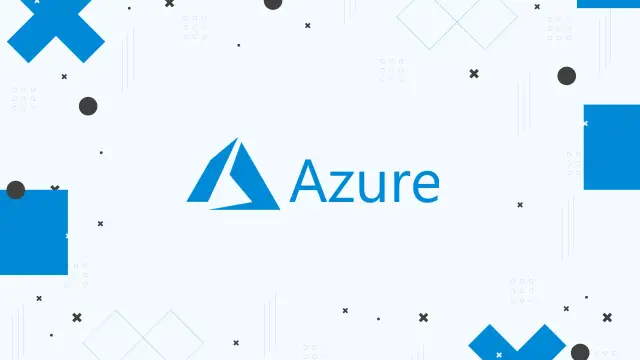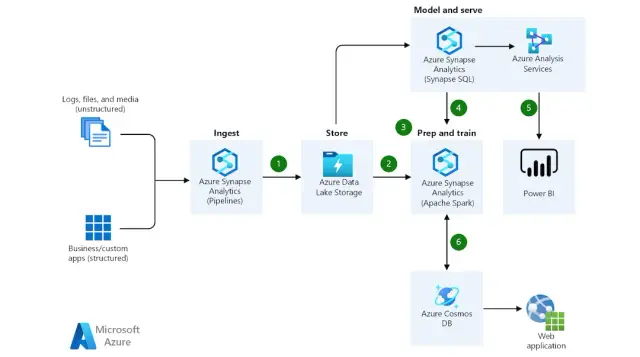What is Microsoft Azure: How Does It Work and Services
Uncover the capabilities of Microsoft Azure, the cloud platform that offers services for computing, storage, & data management.

Microsoft Azure is a widely adopted cloud computing platform that offers comprehensive services and tools to help businesses and organizations of all sizes. Whether you are a small startup or a large enterprise, Azure has something to offer you. In this article, we will explore the capabilities of Azure, how it works, and the various services it provides, such as computing, storage, and data management. By the end of this article, you will have a better understanding of Azure and its potential to support your business and organization's growth. Join us as we dive into the world of Azure and discover how it can take your business to the next level.
What is Microsoft Azure?
Microsoft Azure is a cloud-based platform and service offered by Microsoft that allows for the development, deployment, and management of applications and services through a worldwide network of Microsoft-managed data centers. It provides various services, such as computing, storage, data management, and more. Azure allows users to choose from various programming languages, frameworks, and tools to build and deploy applications. It also provides various services for analytics, security, the Internet of Things (IoT), and artificial intelligence (AI). With Azure, users can also take advantage of its scalability, reliability, global reach, and integration with other Microsoft products and services.
You can deploy an app developed by AppMaster on Microsoft Azure services as well as in other similar services. This is achieved due to the fact that AppMaster is a no-code platform that generates source code that you can take and place both on third-party services and on your own servers.

How does Azure work?
Microsoft Azure provides a range of services and tools that can be accessed over the internet through a web portal or API s. The services and tools provided by Azure can be broadly categorized into three main categories:
- Compute services: These services can run virtual machines, containers, and web and mobile apps in the cloud. Azure offers services such as Azure Virtual Machines, Azure App Service, and Azure Container Instances.
- Storage services: These services can store and manage data in the cloud. Azure offers services such as Azure Blob Storage, Azure Files, andAzure Queue Storage.
- Data management services: These services can manage and analyze data in the cloud. Azure offers services such as Azure SQL Database, Azure Cosmos DB, and Azure Data Factory.
When you use Azure, you can use the web portal or APIs to create and configure resources, such as virtual machines and storage accounts. Once these resources are created, you can run your applications and store your data. Azure also provides tools and services to help you manage and monitor your resources, such as Azure Monitor and Azure Automation.
Azure is built on a global network of Microsoft-managed data centers, which allows users to deploy and run their applications and services in multiple regions around the world. This allows for better performance, high availability, and disaster recovery.
Azure provides a comprehensive set of services and tools that can be accessed over the internet, which allows you to build, deploy and manage your applications, and store and manage your data in a reliable and scalable way; it also provides tools and services to monitor and manage your resources.
What are the various Azure Services
Microsoft Azure provides a wide range of services that can be used to build, deploy, and manage applications and services in the cloud. Some of the major services provided by Azure include:
- Compute services: These services can run virtual machines, containers, and web and mobile apps in the cloud. Azure offers services such as Azure Virtual Machines, Azure App Service, and Azure Container Instances.
- Storage services: These services can store and manage data in the cloud. Azure offers services such as Azure Blob Storage, Azure Files, and Azure Queue Storage.
- Data management services can manage and analyze data in the cloud. Azure offers services such as Azure SQL Database, Azure Cosmos DB, and Azure Data Factory.
- Networking services: These services provide the ability to connect and secure resources in the cloud. Azure offers services such as Azure Virtual Network, Azure ExpressRoute, and Azure DNS.
- Security services: These services provide the ability to protect resources in the cloud. Azure offers services such as Azure Active Directory, Azure Key Vault, and Azure Security Center.
- Artificial Intelligence & Machine Learning services: These services provide the ability to apply intelligence to applications and services. Azure offers services such as Azure Cognitive Services, Azure Machine Learning, and Azure Databricks.
- Internet of Things services can connect and manage IoT devices in the cloud. Azure offers services such as Azure IoT Hub, Azure IoT Central, and Azure IoT Edge.
- Developer services: These services provide the ability to build, deploy, and manage applications in the cloud. Azure offers services such as Azure DevOps, Azure App Service, and Azure Functions.
These are just a few examples of Azure's wide range of services, and new services are being added regularly. The Azure Marketplace also offers many other services from Microsoft partners and independent software vendors, which can be easily integrated with Azure services.
Why use Azure?
There are several reasons why an organization or business might choose to use Microsoft Azure:
- Scalability: Azure allows organizations to scale their resources up or down as needed easily, so they only pay for what they use.
- Global reach: Azure has a global network of data centers, allowing organizations to deploy and run their applications and services in multiple regions worldwide.
- Integration: Azure integrates with other Microsoft products and services, such as Office 365 and Dynamics 365, which can be useful for organizations that are already using these products.
- Flexibility: Azure supports a wide range of programming languages, frameworks, and tools, which allows organizations to build and deploy applications using the technologies they are already familiar with.
- Security: Azure provides a range of security features and services to help protect organizations' resources and data in the cloud.
- Artificial Intelligence and Machine Learning: Azure provides a range of AI and ML services that can be integrated into applications and services, which can help organizations gain insights and make better decisions.
- Internet of Things: Azure provides a range of IoT services that can be used to connect, manage and analyze data from IoT devices and provide insights
- Cost-effective: Azure allows organizations to pay for only what they use, which can be more cost-effective than maintaining and managing their own on-premises infrastructure.
- Compliance: Azure is compliant with several industry standards, such as HIPAA.
Azure History
Microsoft Azure, previously known as Windows Azure, was first announced in 2008 and officially launched in 2010. It initially focused on providing a platform for developing and deploying web applications and services in Microsoft's data centers. Over the years, Azure has grown to become a comprehensive cloud computing platform with a wide range of services and tools that can support businesses and organizations of all sizes.
In 2014, Microsoft rebranded Windows Azure as Microsoft Azure and announced new services and features such as Azure Virtual Machines, Azure Web Sites, Azure Mobile Services, and Azure Media Services. In 2015, Azure introduced several new services, such as Azure Resource Manager, Azure Container Service, and Azure IoT Suite. In 2016, Azure introduced several new services, such as Azure Functions, Azure Logic Apps, Azure Service Fabric, and Azure Container Registry.
Over the past few years, Microsoft has continued to invest in and expand Azure, adding new services and features such as Azure Machine Learning, Azure Cognitive Services, Azure IoT Central, and Azure Stack. Today, Azure is one of the most widely used cloud computing platforms and is considered one of the top three cloud providers in the market, along with Amazon Web Services (AWS) and Google Cloud Platform (GCP).
Conclusion
In conclusion, Microsoft Azure is a widely adopted cloud computing platform that offers comprehensive services and tools to help businesses and organizations of all sizes. Azure allows users to choose from various programming languages, frameworks, and tools to build and deploy applications. It also provides various services for analytics, security, the Internet of Things (IoT), and artificial intelligence (AI).
Azure's scalability, reliability, global reach, and integration with other Microsoft products and services make it an attractive option for organizations looking to move to the cloud. The Azure Marketplace also offers many other services from Microsoft partners and independent software vendors, which can be easily integrated with Azure services. With its history of ongoing development and investment, Azure is considered one of the top three cloud providers in the market and continues to be a valuable resource for businesses and organizations looking to support their growth in the future.
FAQ
What is Microsoft Azure?
Microsoft Azure is a cloud-based platform and service developed by Microsoft that allows for the creation, deployment, and management of various applications and services via a worldwide network of Microsoft-controlled data centers.
How does Microsoft Azure work?
Microsoft Azure provides various services, including virtual machines, storage, and databases, that can be used to build and run applications. These services can be accessed through the Azure portal, a web-based interface, or through Azure APIs and command-line tools. Applications can be deployed to Azure using various methods, including uploading code, containerization, or pre-built templates.
What services does Microsoft Azure offer?
Microsoft Azure offers a wide range of services, including:
- Virtual Machines: Create and manage virtual machines in the cloud.
- Storage: Store and manage data in the cloud, including blobs, files, tables, and queues.
- Databases: Create and manage databases in the cloud, including Azure SQL Database and Azure Cosmos DB.
- Networking: Create and manage virtual networks and load balancers.
- Internet of Things (IoT): Connect, monitor, and control IoT devices.
- Machine Learning: Create and deploy machine learning models.
- DevOps: Manage code, builds, and deployments.
- Security and Identity: Protect your applications and data with Azure Active Directory and Azure Security Center.
- Big Data: Analyze large datasets with Azure HDInsight and Azure Data Factory.





